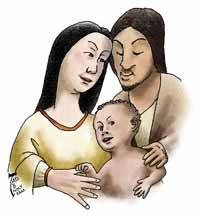Holy Families
During the holiday season much attention is placed on romanticizing the family. Christmas movies and advertisements portray happy reunions and joyous family gatherings. In reality, however, many families experience pain and loss that is all the more acute during the holidays. Perhaps a loved one has died during the past year. A family member may be fighting in a distant war. Old hurts may keep some from wanting to be with family. A failed marriage may have split apart parents, who struggle with how to share their love and time equitably with their children. Most families do not match the Norman Rockwell picture of everyone living happily as one. Today’s readings may sound at first like an idealized portrait of family life, but a closer look reveals a very realistic understanding of what it takes to create a harmonious home.
The first reading and the responsorial psalm present a theology of retribution, which is typical of wisdom literature. If you do good, says the Book of Sirach, then good things happen to you; if you do evil, then evil befalls you. Thus Ben Sira advises that if you treat your parents well, especially by caring for them in their old age, you can expect the rewards of riches, children, a long life and answered prayers.
The Gospel, however, proves that this theology does not work. Those who do good and who try to follow God’s ways in everything often experience great pain and suffering. Mary and Joseph are completely devoted to God and follow all the prescriptions of the Law, yet, as Simeon prophesies, they struggle like all faithful people to understand God’s ways. At the annunciation Mary says yes, even as she questions “How can this be?” (Lk 1:34). What God asks of her puts her in very difficult circumstances. Other people in Nazareth know that she and Joseph formally belong to each other but have not begun to live together. What kinds of things will they think and say about her when her blessed child is born too soon? Contemplation, faithfulness and trust are three essential virtues that Mary exemplifies for weathering difficult times that challenge harmonious family life.
To these virtues Paul adds seven more: “heartfelt compassion, kindness, humility, gentleness, patience, bearing with one another and forgiving one another.” One could take each of these in turn, one for each day of the week, praying for an increase in each as a gift from God. To this add forgiveness, a gift we are able to extend to others when we know how much God has forgiven us. Then cap it off with love, which is like the overcoat that one dons over all the others. In the Bible, love is not concerned with feelings, but with deeds. Love is treating others as covenanted members of God’s people and desiring good for them, just as God does.
The worldview reflected in both Sirach and the Letter to the Colossians is patriarchal. For Ben Sira, the father is the authority figure in the home, and his authority passes to his adult son, to whom the text is addressed. In the second reading, Paul’s instruction to wives to be subordinate to their husbands and children to their parents reflects a patriarchal household code that had been in use since at least the time of Aristotle. It is important to recognize the time-bound nature of these patriarchal structures of authority and obedience. In today’s ideal family both mother and father exercise authority and responsibility in a mutually loving and respectful way, where no one is dominant over another. When egalitarian relationships exist also in our faith communities, both our family of faith and our family of origin become havens of peace and thankfulness.
This article also appeared in print, under the headline “Holy Families,” in the December 22, 2008, issue.








